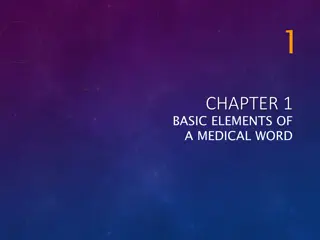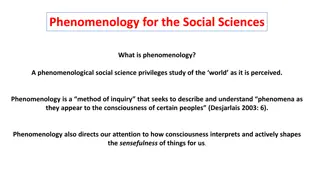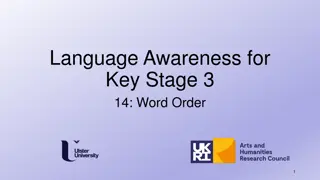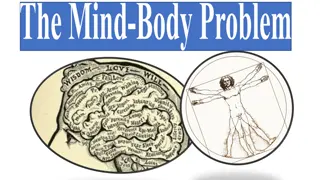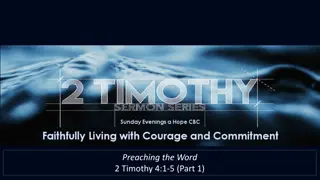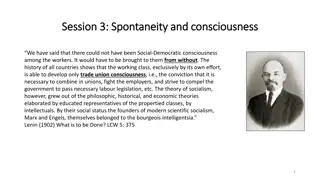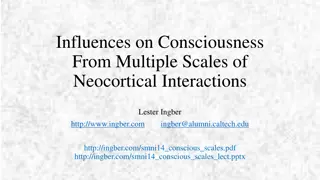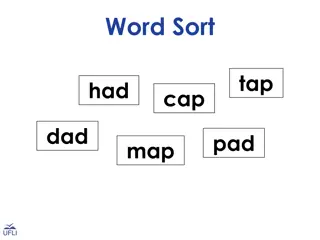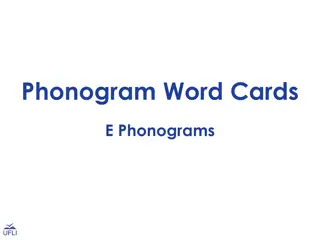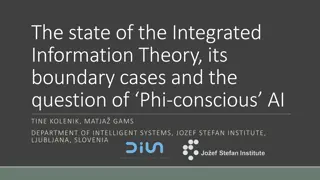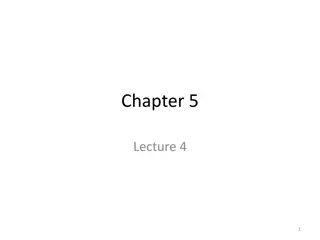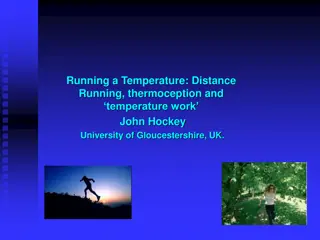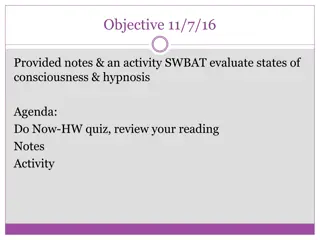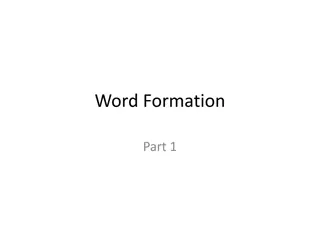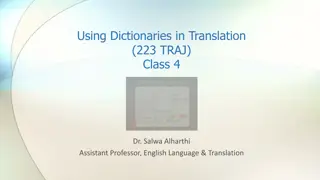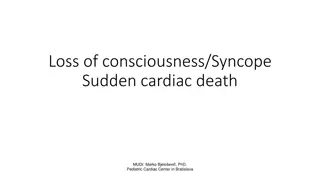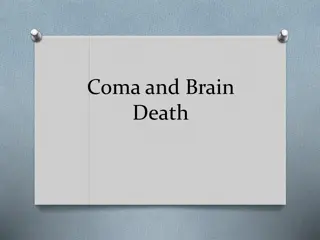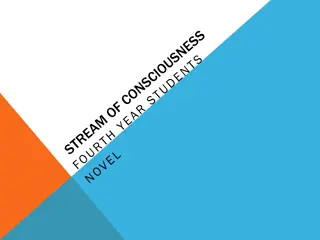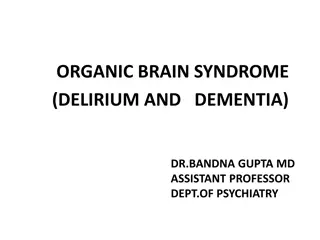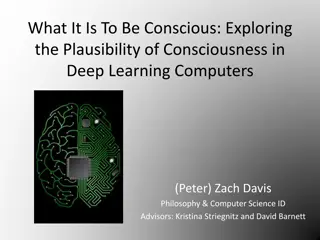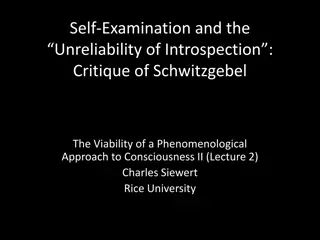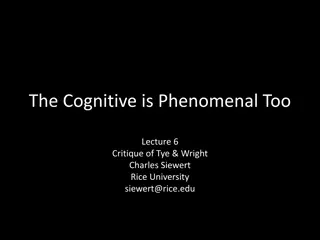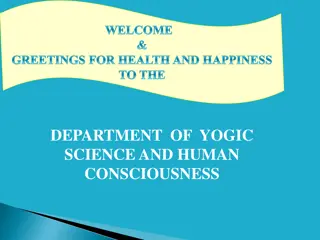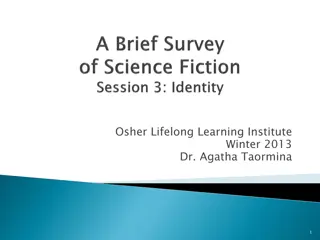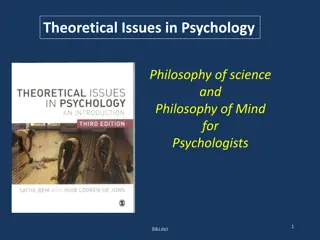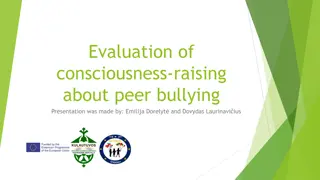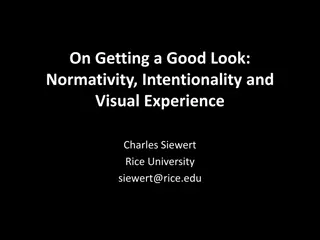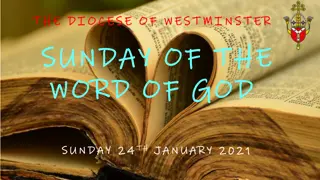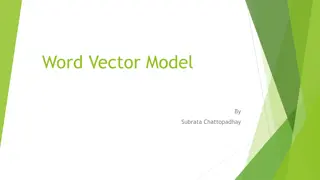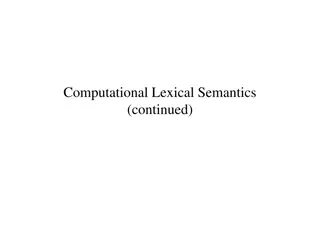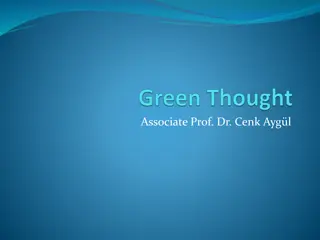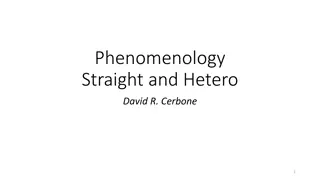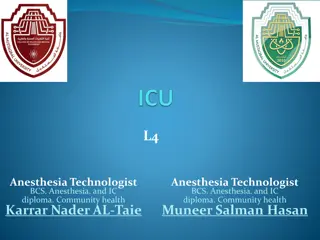Understanding Medical Word Elements: Roots, Combining Forms, Suffixes, and Prefixes
Medical terminology uses word elements like roots, combining forms, suffixes, and prefixes. Word roots provide the main meaning, combining forms connect elements, suffixes modify word meaning, and prefixes are placed at the beginning of words. Examples illustrate how these elements are used in medic
6 views • 13 slides
Understanding Fainting: Causes, Symptoms, and Treatment
Fainting, a sudden loss of consciousness, can be caused by various factors such as hyperventilation, heart disease, medications, alcohol use, and more. Recognizing symptoms like lightheadedness, weakness, and blurred vision is crucial. Learn how to assist someone who feels faint and what to do if th
0 views • 9 slides
Understanding Phenomenology in Social Sciences
Phenomenology in social sciences focuses on studying the world as perceived by individuals, emphasizing the active and passive aspects of consciousness. This approach explores how consciousness shapes our perception of the world and highlights the intentional acts and embodied experiences that give
0 views • 13 slides
Stages of First Language Acquisition in Children
First language acquisition in children progresses through distinct stages including cooing and babbling, the one-word stage, the two-word stage, and telegraphic speech. These stages mark the development of speech sounds, single-word utterances, two-word combinations, and more complex speech structur
2 views • 16 slides
Understanding Word Order in Different Languages
Explore the fascinating world of word order in languages. Discover how different languages arrange words in various ways, such as Subject-Verb-Object (SVO), Subject-Object-Verb (SOV), and more. Delve into the diversity of word orders for subjects, objects, and verbs, and uncover how language structu
2 views • 31 slides
The Mind-Body Problem: Exploring Consciousness and Intentionality
Delve into the intriguing questions surrounding the mind-body problem, such as the nature of consciousness, intentionality, subjectivity, and causation. Explore the mysteries of how thoughts, beliefs, and sensory experiences interact with the physical body and the external world. Contemplate the eni
0 views • 33 slides
Faithful Living and Preaching God's Word in 2 Timothy
In 2 Timothy, the call to preach the Word faithfully is emphasized, highlighting the importance of living with courage and commitment in spreading God's message. The text underscores the need to remain steadfast in the face of challenges and to uphold the truth of God's Word amidst changing times. T
0 views • 12 slides
The Role of Consciousness in Social-Democratic Thought
The development of socialist consciousness among the working class is discussed, emphasizing the need for outside influence to foster class and political awareness. Key figures such as Lenin and Kautsky are cited in their exploration of how consciousness is acquired and its significance in the labor
0 views • 6 slides
Exploring Influences on Consciousness Through Neocortical Interactions
Delve into the intriguing realm of consciousness with Lester Ingber's research on the influences stemming from multiple scales of neocortical interactions. The investigations cover various aspects such as mind over matter, recursive interactions, neuronal scales in the neocortex, and statistical mec
1 views • 41 slides
Engaging Word Sorting Activity for Students
Encourage student engagement with a hands-on word sorting activity involving phonograms. Students copy word cards into categories, read each word, and determine its appropriate category in a fun and interactive manner using a sorting chart.
2 views • 5 slides
Understanding Altered States of Consciousness: Trance Practices in Different Cultures
Explore the ethnographic work on trance practices in Middle America and the Caribbean, comparing and contrasting how possession and trance phenomena are organized into types by anthropologists. Discover how shamans induce trances through mechanisms like singing, chanting, drumming, and dancing, lead
0 views • 18 slides
Phonogram Word Cards for Teaching Phoneme-Grapheme Correspondences
Explore a collection of phonogram word cards featuring various phoneme-grapheme correspondences for educational activities like word sorts and review games. Enhance phonics skills with word lists containing words sharing the same phonogram, covering a wide range of graphemes and phonemes. Utilize th
0 views • 32 slides
Exploring the Integrated Information Theory and Conscious AI
Delve into the Integrated Information Theory (IIT) and its impact on understanding consciousness, including its correlation with artificial intelligence. The IIT posits key axioms and postulates to define consciousness, exploring boundary cases and implications for AI development.
0 views • 11 slides
Understanding Word Meaning in Lexical Semantics
Introduction to Chapter 5 Lecture 4.1 discusses the nature of word meaning, major problems of lexical semantics, and different approaches. It explains the concept of a word, prototypical words, lexical roots, lexemes, and word forms, highlighting the importance of the word as a lexeme in lexical sem
1 views • 20 slides
The Phenomenology of Temperature Awareness in Distance Running
Researchers at the University of Gloucestershire explore the embodied consciousness of distance runners, focusing on thermoception and temperature regulation. Utilizing sociological phenomenology and phenomenological ethnography, the study delves into the sensory experiences of runners, emphasizing
0 views • 29 slides
Strawson's Thin Subjects in Consciousness: Exploring Emergence and Alternatives
Exploring the concept of Strawson's Thin Subjects in consciousness through the lens of emergence and alternative theories such as Panpsychism, Neutral Monism, and Dual-aspect Theory. Delve into the debate on whether experience is always accompanied by a subject of experience and the challenges posed
0 views • 16 slides
Understanding States of Consciousness and Hypnosis in Psychology
Explore the concept of consciousness and hypnosis in psychology through a series of engaging activities. Delve into topics such as the capacity of consciousness, dream analysis, and the effects of hypnosis on behavior. Gain insights into the basics of consciousness and its role in shaping our awaren
0 views • 27 slides
Understanding Word Formation and Coinage in English
Word formation in English involves different processes such as compounding, conversion, and derivational affixation. Compounding combines two or more words to create a new word, while conversion changes the word class without affixes. Word coinage includes compounds, acronyms, back-formations, abbre
0 views • 10 slides
Understanding the Role of Dictionaries in Translation
Dictionaries play a crucial role in translation by helping users find information about linguistic signs, word division, spelling, and word formation. The lemma serves as a representative of a lexical item in a dictionary, aiding users in locating specific entries. Word division information can assi
0 views • 12 slides
Understanding Loss of Consciousness and Sudden Cardiac Death in Children
Loss of consciousness, including syncope and sudden cardiac death, is a significant concern in pediatric patients. The epidemiology shows that approximately 25% of children experience at least one episode of loss of consciousness before the age of 19, with girls visiting pediatricians more than boys
0 views • 5 slides
Understanding Coma, Brain Death, and the Examination Process
Exploring the definitions of coma and altered consciousness, understanding brain death examinations, criteria for determining brain death, who can perform the exam, Texas law on the definition of death, and components of a brain death exam. Learn about different states of altered consciousness, the
0 views • 14 slides
Understanding Stream of Consciousness in Literature: Examples from James Joyce and Virginia Woolf
Stream of consciousness is a narrative technique capturing the flow of characters' thoughts. James Joyce's "Ulysses" delves into Leopold Bloom's introspections, while Virginia Woolf's "Mrs. Dalloway" explores internal feelings. These examples showcase the vivid use of this literary device.
0 views • 9 slides
Understanding Organic Brain Syndrome & Delirium
Overview of organic brain syndrome and delirium, including definitions, clinical features, and management. Delirium, a common psychiatric syndrome, affects consciousness, cognition, and perception, leading to increased morbidity and mortality. Recognize core symptoms, such as disturbances in conscio
0 views • 37 slides
Exploring Consciousness in Deep Learning Computers
Delve into the plausibility of consciousness in deep learning computers through the lens of artificial neural networks and machine learning. While these technologies offer remarkable potential, the debate around their consciousness remains inconclusive.
0 views • 34 slides
Critique of Self-Examination and Unreliability in Introspection
The discussion revolves around the viability of a phenomenological approach to consciousness, critiquing the reliance on introspection and the unreliability of first-person judgments. The argument favors plain, analytical phenomenology over heterophenomenology, highlighting the challenges posed by f
0 views • 28 slides
Jewish Meditation Techniques for Stress Relief
Discover Jewish meditation techniques for centering the mind, utilizing breath as worship, Hebrew letters as channels of consciousness, and the primary technique of Havayah Breath. Learn how Jewish meditation aims to cultivate a sense of wellness and higher consciousness by focusing on the Divine th
0 views • 15 slides
Exploring Phenomenal Consciousness: Reducibility, Variation, and Cognitive Phenomenology
Delve into the rich realm of phenomenal consciousness, dissecting the interplay between sensory and conceptual elements. Contemplate the essence of cognitive activity, sensory features, and the potential inclusion of non-sensory aspects within consciousness. As you ponder reducibility, variation, an
0 views • 28 slides
Department of Yogic Science and Human Consciousness - Achievements and Courses Offered
Established in June 1996 under UGC's 9th 5-Year Plan, the Department of Yogic Science and Human Consciousness integrates ancient Indian learning, promotes moral values through yoga, and explores the benefits of yoga in various fields. They offer post-graduate courses in Yoga Studies & Therapy Manage
0 views • 14 slides
Understanding Text Similarity Techniques in NLP
Explore various text similarity techniques in Natural Language Processing (NLP), including word order, length, synonym, spelling, word importance, and word frequency considerations. Topics covered include bag-of-words representation, vector-based word similarities, TF-IDF weighting scheme, normalize
2 views • 62 slides
Exploring Human and Animal Consciousness in the Modern Era
Delve into the intricacies of human and animal consciousness, examining topics such as sentience, medical interventions, transplants, cyborgs, genetics, and the presence of consciousness in non-human animals. Discover how advancements like transplants, prosthetics, and scientific conclusions challen
0 views • 33 slides
Exploring Theoretical Issues in Psychology: Consciousness, Qualia, and Free Will
Delve into the complexities of consciousness, qualia, and free will in the realm of psychology, examining topics such as phenomenal experiences, naturalistic vs. mentalistic views, and the neurobiological perspective on emotions and self-consciousness.
0 views • 14 slides
Evaluation of Consciousness-Raising About Peer Bullying: Insights from a Presentation
The presentation on consciousness-raising about peer bullying by Emilija Dorelyt and Dovydas Laurinavičius included a participation questionnaire with 18 girls and 24 boys aged 14-16. Results showed disparities in awareness, sources of information, and responses to bullying between genders, highlig
0 views • 11 slides
Exploring Normativity and Visual Experience in Consciousness Philosophy
Charles Siewert from Rice University delves into the intersection of normativity and sensory experience within the realm of consciousness philosophy. He discusses the nonreductionist stance, a phenomenological approach, and the relationship between sensory experiences and judgments. The concept of g
0 views • 44 slides
The Sunday of the Word of God Celebration - 24th January 2021
The Sunday of the Word of God, observed on the 24th of January 2021, is dedicated to the celebration, study, and dissemination of the Word of God. Pope Francis encourages Catholics worldwide to deepen their relationship with God through His Word. The event highlights the importance of valuing both t
0 views • 27 slides
Understanding Word Vector Models for Natural Language Processing
Word vector models play a crucial role in representing words as vectors in NLP tasks. Subrata Chattopadhyay's Word Vector Model introduces concepts like word representation, one-hot encoding, limitations, and Word2Vec models. It explains the shift from one-hot encoding to distributed representations
0 views • 25 slides
Understanding Word Sense Disambiguation in Computational Lexical Semantics
Word Sense Disambiguation (WSD) is a crucial task in Computational Lexical Semantics, aiming to determine the correct sense of a word in context from a fixed inventory of potential word senses. This process involves various techniques such as supervised machine learning, unsupervised methods, thesau
0 views • 67 slides
Evolution of Environmental Consciousness: A Historical Perspective
The evolution of environmental consciousness is traced through key milestones like the emergence of ecological science, formation of environmental organizations, and the rise of New Social Movements. From the pioneering works of Ernst Haeckel to the foundation of Friends of the Earth and Greenpeace,
0 views • 15 slides
Contrasting Philosophical Perspectives: Husserl vs. Dennett
Phenomenologist Husserl and philosopher Dennett hold contrasting positions on consciousness, naturalism, methodology, and science, with Husserl emphasizing foundational philosophy and Dennett favoring a scientific approach. The divergence in their perspectives is centered on consciousness, with each
0 views • 128 slides
Understanding the Glasgow Coma Scale (GCS) in Healthcare
The Glasgow Coma Scale (GCS) is a critical tool for assessing the level of consciousness in patients, commonly used in head trauma cases but applicable across various medical settings. The GCS evaluates eye opening, verbal response, and motor responsiveness, assigning scores to each aspect to determ
0 views • 17 slides
Exploring Tooley's Argument on Abortion and Infanticide
Tooley challenges the common argument against abortion by proposing that fetuses and infants do not meet the Self-Consciousness Requirement (SCR) to have a right to life. He distinguishes between human and person, emphasizing the moral implications. The key questions raised revolve around the proper
0 views • 26 slides
